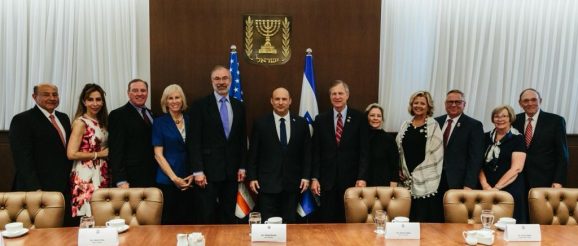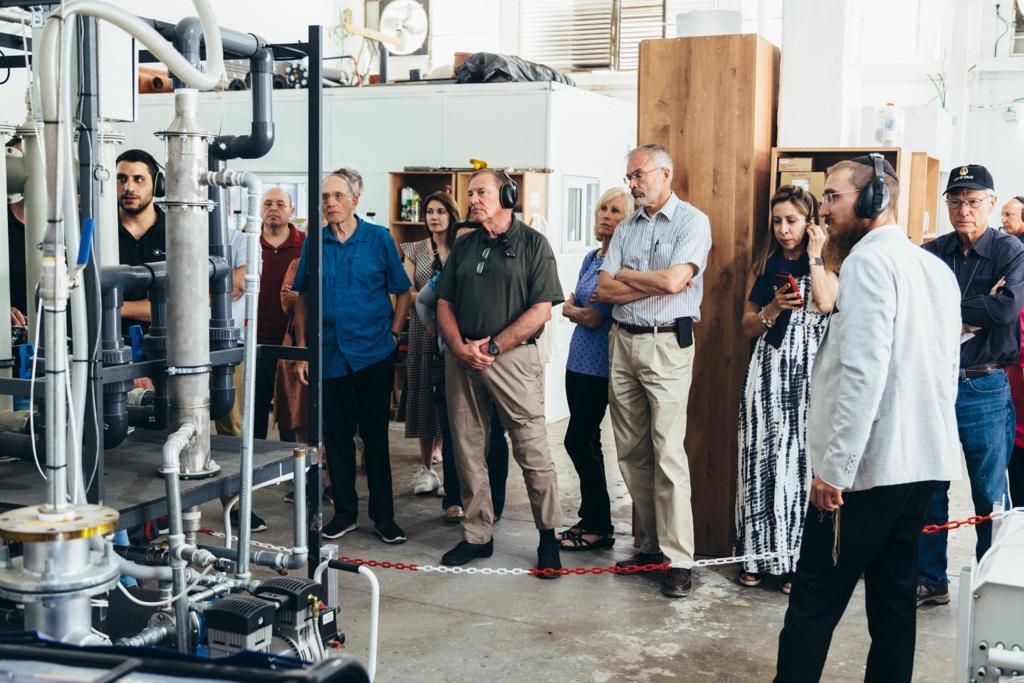Meeting of congressional minds about business, tech, innovation in Judea and Samaria

It’s the only congressional delegation to Israel that goes into Judea and Samaria, and they’re finding more and more to talk about back in Washington.
A five-member, bipartisan House delegation was in Israel last week for talks with Israeli Prime Minister Naftali Bennett, Defense Minister Benny Gantz and Opposition Leader Benjamin Netanyahu. The mission, sponsored by the U.S. Israel Education Association (USIEA), included inspections of joint Israel-Palestinian businesses and economic projects, along with research and defense outposts.
“I think that a fact-finding trip like this is just invaluable, especially for us members of the United States Congress. Because we want to find solutions. We’ve had the loggerheads between the Palestinian Authority and the Israeli government that we’ve seen for so long. We’ve got to find some solutions for this problem,” Rep. Brian Babin (R-Texas) told JNS. “And I think we’ve made some progress this week, meeting with universities and other entities. We met with individuals on both sides of the issue that really are visionaries, and we’ve seen some great successes in Ariel with some of the businesses there and with the leaders that we’ve met, with Palestinians and Jewish Israelis working together.”
Other members of the delegation included Reps. Mike Bost (R-Ill.), Lou Correa (D-Calif.), Neal Dunn (R-Fla.) and Andy Harris (R-Md.).
In addition to stops in Hebron and the Garden of Gethsemane on the Mount of Olives in Jerusalem, they visited the laboratory at Ariel University, where systems for driverless cars are being developed and improved. There was also a stop at Ariel’s Standard Carbon, where technology is developed to provide a sustainable solution to climate change by converting CO2 emissions to energy that can be stored and deployed economically anywhere globally utilizing existing infrastructure.
“The businesses that we were able to go to through via the Judea and Samaria Chamber of Commerce—how they’re putting together the opportunity for joint business ventures between the Israeli and Palestinian private sectors—quite often, we can’t get the governments to agree. But we can get the private sector to come together to produce products that are beneficial to Israel and to the world. It also puts people to work on both sides of that line” (the so-called “Green Line” delineating sovereign Israel from Judea and Samaria), Bost told JNS.
He pointed to a prior congressional trip to Israel that also included stops in Egypt and Jordan, at a time when joint water and electricity projects were under discussion, which he said proved to him that such ventures could further peace in the region.
“I got to discuss with [Bennett] the Abraham Accords and how those are working positively,” said Bost. “We can understand the position of where Israel is, and then how it is that we can go ahead and make sure we make our investment to try to help. I think the investment is in working together among the people, and not necessarily that they’re going to find a solution to the argument of one state, two states or however many states. Those arguments are going nowhere.”
The delegation was also given a look at the Israeli-made Spike-Firefly, which Israeli defense company Rafael calls a “miniature electro-optical tactical loitering munition.” The U.S. Army tested the drone last month and is considering purchasing it.

‘Repatriating, nearshoring and onshoring of production’
The delegation also followed up on a USIEA initiative to aid in the shifting of the U.S. pharmaceutical supply chain away from dependence on China, and more reliant on Israel and its Middle East partners. The topic has previously been discussed among influential committee chairmen in Congress.
Heather Johnston, USIEA founder and executive director, told JNS that Bennett was not aware of the initiative, which preceded his time as prime minister, but that he “kind of lunged toward the life sciences and pharmaceuticals collaboration” once he was filled in on the details about it last week.
“We were able to bring that to the table, and he asked if he could have his staff follow up with that,” she said.
Other domestic outsourcing opportunities were pursued during the delegation’s visit as well.
“We spent the last couple of days with a bunch of Palestinians who are very active in the economic sphere. We spoke with academics at universities who want their graduates to have high-end jobs when they graduate. We talked about repatriating, nearshoring and onshoring of production, and I think there’s a real possibility to cooperate. The Palestinians have a rather large, talented workforce that is underutilized,” Dunn told JNS.
“Israel does a great job with innovation and invention R&D; a lot of times they’re the ones doing the innovating, and we’re the ones doing the production, and that actually speeds up the whole innovation process. They tend to be a little more nimble over here than perhaps we are in some ways. And that’s mostly true, I think, in biotech,” observed Dunn. “I’m a doctor by training, and health care is near and dear to my heart. I’ve done a lot of research over the years on pharmaceuticals. They have a great pharmaceutical industry over here, as well as with medical devices.”
Correa, the lone Democrat in the delegation, said he wasn’t approaching the trip from the perspective of his party. Rather, he is an American who believes that Israelis and Palestinians have the same concerns as his constituents back home and that the United States should focus more on assisting with that as opposed to trying to step in to solve the broader conflict, he said.
“I would call it a perspective from Main Street. Part of the solution is letting the folks on Main Street, so to speak, figure it out—business to business, individual to individual. If you’re trying to survive on a daily basis, trying to pay your bills, trying to balance that balance sheet, make cash payments on a day-to-day basis, maybe you ought to let those folks figure it out and see if they can come up with a solution that,” said Correa.
“Most of the world’s decision-making has resulted in the fact that we don’t have a lot of business on the West Bank that has been developed, especially between Israeli and Palestinians. I think this presents an opportunity for people to go out and work together, to get to know each other. To pursue opportunities in the area and move ahead,” Correa told JNS. “What are the issues in my district? Good jobs, training of our workforce, health care, housing, clean water. Same stuff here. It’s not rocket science. It’s just common-sense solutions to everyday problems.”
Overall, Johnston found the week’s mission to be successful. Johnston sits on the Partnership for Peace Fund Advisory Board, which advises the U.S. Agency for International Development (USAID) on how to distribute $250 million in congressionally approved funds meant to promote peaceful coexistence between Israelis and Palestinians.
“I think that a focal point of education for us is showing the grassroots movement,” she said. “You’ve had a top-down peace process that has failed. Let’s all admit it has failed. It’s just that something’s got to give way because the Palestinian people for decades have lived as pawns inside of a political process versus being able to flourish and find a way forward. Business is the way forward.”
The post Meeting of congressional minds about business, tech, innovation in Judea and Samaria appeared first on JNS.org.
